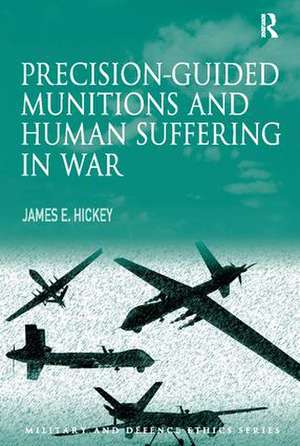Precision-guided Munitions and Human Suffering in War: Military and Defence Ethics
Autor James E. Hickeyen Limba Engleză Paperback – 22 mai 2017
| Toate formatele și edițiile | Preț | Express |
|---|---|---|
| Paperback (1) | 416.22 lei 6-8 săpt. | |
| Taylor & Francis – 22 mai 2017 | 416.22 lei 6-8 săpt. | |
| Hardback (1) | 1061.06 lei 6-8 săpt. | |
| Taylor & Francis – 20 sep 2012 | 1061.06 lei 6-8 săpt. |
Preț: 416.22 lei
Nou
Puncte Express: 624
Preț estimativ în valută:
79.64€ • 82.17$ • 66.46£
79.64€ • 82.17$ • 66.46£
Carte tipărită la comandă
Livrare economică 27 martie-10 aprilie
Preluare comenzi: 021 569.72.76
Specificații
ISBN-13: 9781138115699
ISBN-10: 113811569X
Pagini: 272
Dimensiuni: 156 x 234 x 14 mm
Greutate: 0.45 kg
Ediția:1
Editura: Taylor & Francis
Colecția Routledge
Seria Military and Defence Ethics
Locul publicării:Oxford, United Kingdom
ISBN-10: 113811569X
Pagini: 272
Dimensiuni: 156 x 234 x 14 mm
Greutate: 0.45 kg
Ediția:1
Editura: Taylor & Francis
Colecția Routledge
Seria Military and Defence Ethics
Locul publicării:Oxford, United Kingdom
Notă biografică
James E. Hickey is a Director at the College of Distance Education, US Naval War College, Newport, USA.
Recenzii
'Modern war technologies, such as smart bombs, promise to reduce unnecessary suffering-but has that really been the case? Answering that question is critical for current debates, such as the ethics of deploying military robots for targeted strikes. In this book, Professor Hickey masterfully connects the dots between military history and philosophy, using real-world data to support his ethical arguments.' Patrick Lin, California Polytechnic State University, USA 'A meticulous examination of modern day precision weapons, their use, and the resulting effects on the target, this book provides extensive analysis on the strategic, operational, and tactical order of effects on not only national policy, but also the philosophical underpinnings concerning the employment of precision-guided weapons versus more destructive weapons.' Lieutenant Colonel Albert F. Priselac II, USAR, US Special Operations Command, MacDill AFB, USA 'Technology has always been part of warfare, but it has not resulted uniformly in diminishing the frequency of conflict or the amount of human suffering in war. In an era of increased reliance on complex and controversial weapons systems, the author provides a valuable historical and ethical framework for thinking about precision-guided munitions as well as the means and meaning of war, today and tomorrow.' Timothy J. Demy, U.S. Naval War College, USA 'The development and deployment of weapons [...] makes Precision-guided Munitions and Human Suffering in War essential reading for all interested in the consequences of warfare and the need to control it. The book will be of interest to students of ethics, just war and military history, as well as those interested in international politics and international relations. It should be read by military and civilian leaders. Unfortunately, probably only a very few will take the trouble to do so.' Medicine, Conflict and Survival
Cuprins
Introduction; Chapter 1 Purposeful Violence: Underlying Causes and the Continuum of Human Responses; Chapter 2 Technology in War: An Evolving Role But With Voices Raised in Warning; Chapter 3 Measuring the Impact: A Comprehensive Framework; Chapter 4 Vietnam: Viable Precision Emerges; Chapter 5 Desert Storm: An Image of Perfect Precision?; Chapter 6 The Balkans: Perfect Precision Attained?; Chapter 7 Contingency Strikes: Expanded Political-Military Action Enabled By Precision; Chapter 8 In The Final Analysis: Summary with Contemporary Reflections and Conclusions;
Descriere
This book seeks to answer the question: Do precision-guided munitions (PGMs) mitigate suffering in war, and have these weapons changed the way decisions regarding war and peace have been made? Answering this question helps us understand possible shifts in emphasis in modern warfare, both in terms of methods employed and of the greater concern placed on limiting human suffering during conflict.
























